中西方文明礼仪
- 格式:ppt
- 大小:3.17 MB
- 文档页数:23
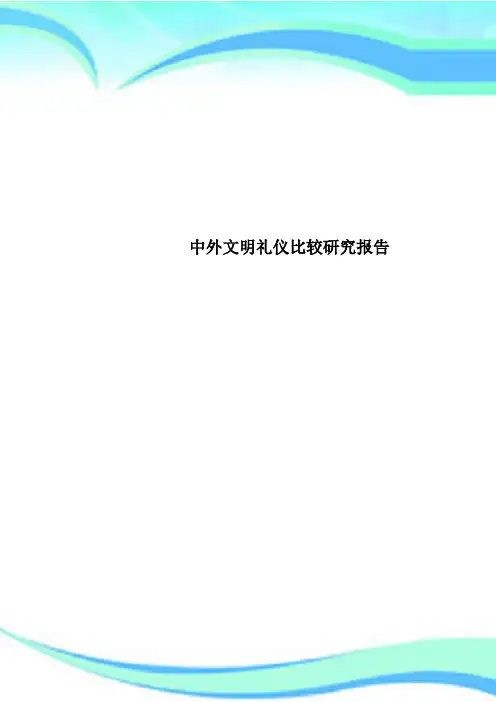
中外文明礼仪比较研究报告中外文明礼仪比较研究报告一、引言文明礼仪是人类社会发展的重要组成部分,不同文化背景下的礼仪习惯差异巨大。
本报告通过对比中西方礼仪习俗,分析中外礼仪差异的原因,并对跨文化交流中的礼仪准则提出建议,旨在提升国际交往的成功率与效果。
二、中西礼仪差异的比较1. 会面礼仪中西方文化中的会面礼仪存在着明显差异。
西方文化注重个体自由与平等,因此在会面时通常不需要严格的礼仪规矩。
中国文化重视尊重与尊严,会面时通常会有一系列礼节,如问候和握手。
### 2. 餐桌礼仪在中外餐桌礼仪中也存在较大的差异。
在中国,餐桌礼仪强调尊重长辈和宾客,讲究筷子的使用规范以及分餐和共餐的区别。
而西方文化中,餐桌礼仪注重餐具的使用技巧和礼节,如用刀叉进食、不放肘子在桌面上等。
### 3. 礼物文化中西方文化对礼物的理解也存在差异。
在中国文化中,礼物代表着情谊和尊重,通常应当用双手接受礼物,并在恰当的时间打开。
而西方人对礼物更加注重礼物本身的意义,通常会在即时打开并表示感激。
### 4. 穿着礼仪中西方穿着礼仪也有各自的规范。
中国文化讲究经典和庄重,重视着装的整齐和庄重。
而西方文化更加注重个人的自由和多样性,在着装上更加开放和随意。
三、中西礼仪差异原因的分析中西礼仪差异的形成是由于两种文化的不同背景和价值观的差异导致的。
中国文化深受传统价值观的影响,注重长辈与上级的尊崇与尊重。
而西方文化强调个人自由和平等,追求个体权利与尊严。
这些价值观上的差异导致了中西礼仪习俗的差异。
四、跨文化交流中的礼仪准则1. 尊重文化差异在跨文化交流中,尊重对方的文化差异是非常重要的。
要意识到不同文化有不同的礼仪习俗,不能简单地以自己的文化标准来衡量他人的行为表现。
### 2. 学习对方礼仪在与外国人交流中,学习对方的礼仪规范是必要的。
了解对方的文化背景和礼仪习惯可以避免在交流中的尴尬和误解。
### 3. 自我审视在跨文化交流中,也要对自己的行为进行反思和批评。

文明的表现中西方礼仪的差异表现1、称谓称呼方面在西方,称呼是比较笼统的,一个称呼可以涵盖中国很多称呼。
例如,西方称呼男的为先生,称呼女的女士或小姐,而在我国“先生”第一解释是“教师”,是对教师最古老最悠久的称谓。
随着改革开放,先生已成为社会上最流行的尊称口语,西方人称”uncle”,可以涵盖我国的婶婶,伯母,姨。
他们对这些方面的关系也不如中国分明,中国父亲那边的为伯伯,姑姑,堂兄妹,母亲方为舅,姨,表兄妹。
在西方人们见面时喜欢直呼其名。
而在中国,人们喜欢加上职位,xx经理,xx总裁等。
这是身份与地位的象征,西方人很少用正式的头衔称呼别人,正式头衔用于法官。
高级政府官员、军官、医生、教授、高级宗教人士等。
2、交际语言方面中国人通常是见面点头致意,握手或行拱手礼,微微欠身然后握手,而西方人认为欠身显得自卑,拥抱是最常见的见面礼与道别礼,亲吻礼与吻手礼也较为常见。
在我国除了见面和告辞时使用,在表示祝贺、感谢或互相鼓励时也使用。
发展到现在,被简单的“你好”,“再见”所取代。
可是西方的贴面礼、亲吻礼、吻身礼,让国人仍很不习惯接受。
中国在见面时喜欢客套的问去哪了有没有吃饭西方则认为这侵犯了他们的隐私,感到奇怪。
送客离开时,中国人习惯挽留,说“走好”“慢走”,而西方仅微笑作再见就可。
3,宴请方面酒文化在中国由来已久,被视为做生意,交朋友等社交场合不可或缺的。
酒杯不空茶水不满。
在西方,通常喝啤酒、葡萄酒,不喜欢劝酒。
在中国,宴会喜欢共桌共菜,西方则认为不合卫生,实行分餐制。
中国人宴请时,觥筹交错,歌舞升平。
西方则要求少声响少动作,用餐程序较多。
4,禁忌习俗中国人不喜欢说4,因为与“死”同音,认为8、6吉利,偏向于双数,追求成双成对。
西方人不喜欢13。
缘起基督教中的故事最后的晚餐,犹大出卖耶稣,有13个人。
也不喜欢星期五。
中国人尊老,而西方人忌老。
中国人喜黄色,有图腾为“龙”,视为龙的传人。
而西方则认为龙是蛇,基督教中蛇就是撒旦、是魔鬼,黄色暗含断交之意。
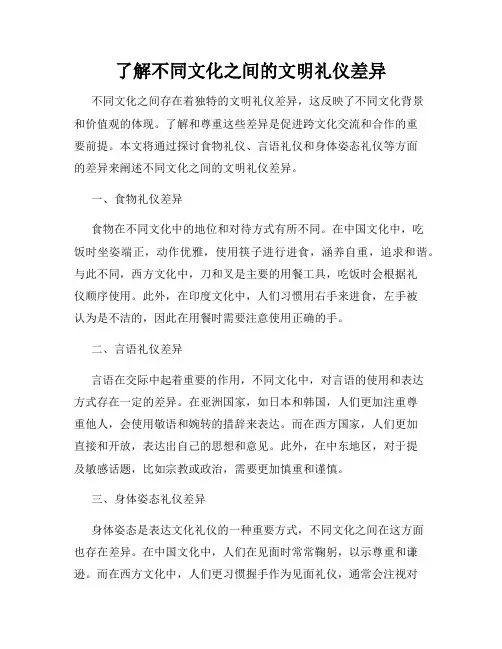
了解不同文化之间的文明礼仪差异不同文化之间存在着独特的文明礼仪差异,这反映了不同文化背景和价值观的体现。
了解和尊重这些差异是促进跨文化交流和合作的重要前提。
本文将通过探讨食物礼仪、言语礼仪和身体姿态礼仪等方面的差异来阐述不同文化之间的文明礼仪差异。
一、食物礼仪差异食物在不同文化中的地位和对待方式有所不同。
在中国文化中,吃饭时坐姿端正,动作优雅,使用筷子进行进食,涵养自重,追求和谐。
与此不同,西方文化中,刀和叉是主要的用餐工具,吃饭时会根据礼仪顺序使用。
此外,在印度文化中,人们习惯用右手来进食,左手被认为是不洁的,因此在用餐时需要注意使用正确的手。
二、言语礼仪差异言语在交际中起着重要的作用,不同文化中,对言语的使用和表达方式存在一定的差异。
在亚洲国家,如日本和韩国,人们更加注重尊重他人,会使用敬语和婉转的措辞来表达。
而在西方国家,人们更加直接和开放,表达出自己的思想和意见。
此外,在中东地区,对于提及敏感话题,比如宗教或政治,需要更加慎重和谨慎。
三、身体姿态礼仪差异身体姿态是表达文化礼仪的一种重要方式,不同文化之间在这方面也存在差异。
在中国文化中,人们在见面时常常鞠躬,以示尊重和谦逊。
而在西方文化中,人们更习惯握手作为见面礼仪,通常会注视对方的眼睛,以表达诚意和信任。
此外,在印度文化中,向长辈致敬时,在特定场合下,人们习惯跪地行礼。
四、面对差异的应对方式在面对不同文化之间的文明礼仪差异时,我们应该保持开放的心态,并尊重对方的习俗和惯例。
在跨文化交流中,尤其要注意不要主观地去判断或轻视他人的行为,而是试图理解并适应对方的文化。
通过多角度的观察和学习,我们可以增进与不同文化背景的人的沟通和理解。
在全球化时代,各个国家和文化之间的交流日益频繁。
了解不同文化之间的文明礼仪差异,有助于提高跨文化交流的效果,并促进各国之间的和谐发展。
只有通过相互尊重和包容,我们才能在多元文化的环境中实现真正的互利共赢。
总结而言,不同文化之间的文明礼仪差异是多方面的,包括食物礼仪、言语礼仪和身体姿态礼仪等方面。

中西文化礼仪的差异论文提纲前言一、中国传统文化中的礼仪1、中国礼仪文化的背景2、中国传统的礼仪习俗3、中国的社交礼仪及衣食习俗二、西方国家中的礼仪文化1、西方礼仪文化的背景及观念2、西方的社交礼仪及衣食习俗三、中国礼仪与西方礼仪的相互交融以及发展趋势1、中西方礼仪的求同存异、兼容并包、相互尊重2、中西礼仪文化的共同和谐发展结束语中西文化礼仪的差异摘要:本文分析了中方文化和西方文化彼此的背景及观念,阐述了中方礼仪文化和西方礼仪文化的差异性及其相互的影响。
提倡在各自尊重和平等相待的基础上,既吸收西方先进的礼仪文化又输出本国的优秀文化,有利于促进中西方之间的文化交融,为双方建立了和谐友好的关系,并且取得了在文化各方面的共同发展。
关键词:中方礼仪;西方礼仪;交融;发展趋势前言随着世界全球化进程的日益加深,科学技术的迅猛发展,世界各地之间的交往也变得空前的活跃和频繁,中西文化的交流已成了一个势不可挡的时代内容。
中国与西方国家之间呈现出许多纷繁复杂、各具特色的文化差异。
在世界现代化浪潮的推动下,中西方文化不断地交替、碰撞,相互融合。
其中,礼仪作为中西方文明的共同财富,受到其影响是深远而具体的。
认清中西礼仪文化的差异,一方面,一个国家无论是在政治上或是在经济贸易中,深刻了解对方国家的礼仪习惯或文化将有利于各国之间的来往交流,另一方面,一个人了解对方的民间礼仪习惯,是体现对对方的尊重,才能够较容易给对方留下一个好印象,以便于双方交往的顺利进行。
一、中国传统文化中的礼仪1、中国礼仪文化的背景中国人自古就素有“礼仪之邦”的美称,中华民族的礼仪文化源远流长,绵延数千年而独具内涵。
礼仪随着人类历史的发展逐渐成为中国传统文化的重要内容,并且在人类的社会活动中发挥着重要的作用。
中国的礼仪,始于夏商周,盛于唐宋,经过不断地发展变化逐渐形成体系,然而中国的这套礼仪体系是在中国特定的地理背景,经济背景和社会背景下形成和发展的。
中华大地位于东亚大陆,它的优越而独特的地理条件是形成中国传统礼仪文化的重要因素,由于中国地域的半封闭性,在古代的交通条件下很难与外界发生联系,使得古代的中国人在很长一段时间内自认为中国就是天下,这给文化礼仪带来一定的保守性,中国人一般愿意维持现状,保持和谐,具备务实求稳的心态,持中庸之道的观念,而且更善于预见未来的危险性,虽然不乏探索和创新的精神,但其冒险性明显弱于西方人。
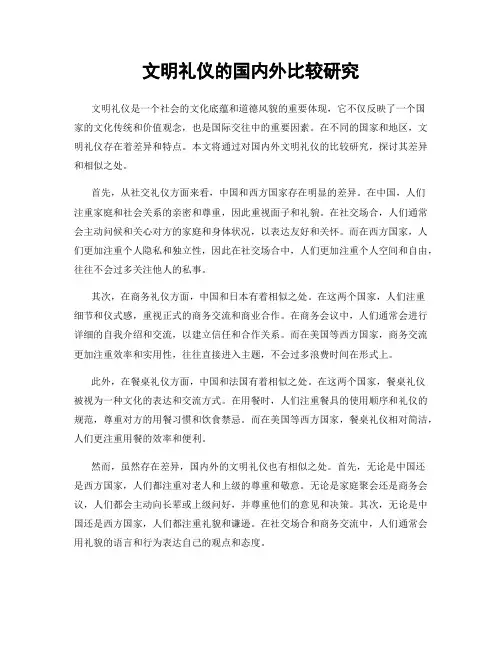
文明礼仪的国内外比较研究文明礼仪是一个社会的文化底蕴和道德风貌的重要体现,它不仅反映了一个国家的文化传统和价值观念,也是国际交往中的重要因素。
在不同的国家和地区,文明礼仪存在着差异和特点。
本文将通过对国内外文明礼仪的比较研究,探讨其差异和相似之处。
首先,从社交礼仪方面来看,中国和西方国家存在明显的差异。
在中国,人们注重家庭和社会关系的亲密和尊重,因此重视面子和礼貌。
在社交场合,人们通常会主动问候和关心对方的家庭和身体状况,以表达友好和关怀。
而在西方国家,人们更加注重个人隐私和独立性,因此在社交场合中,人们更加注重个人空间和自由,往往不会过多关注他人的私事。
其次,在商务礼仪方面,中国和日本有着相似之处。
在这两个国家,人们注重细节和仪式感,重视正式的商务交流和商业合作。
在商务会议中,人们通常会进行详细的自我介绍和交流,以建立信任和合作关系。
而在美国等西方国家,商务交流更加注重效率和实用性,往往直接进入主题,不会过多浪费时间在形式上。
此外,在餐桌礼仪方面,中国和法国有着相似之处。
在这两个国家,餐桌礼仪被视为一种文化的表达和交流方式。
在用餐时,人们注重餐具的使用顺序和礼仪的规范,尊重对方的用餐习惯和饮食禁忌。
而在美国等西方国家,餐桌礼仪相对简洁,人们更注重用餐的效率和便利。
然而,虽然存在差异,国内外的文明礼仪也有相似之处。
首先,无论是中国还是西方国家,人们都注重对老人和上级的尊重和敬意。
无论是家庭聚会还是商务会议,人们都会主动向长辈或上级问好,并尊重他们的意见和决策。
其次,无论是中国还是西方国家,人们都注重礼貌和谦逊。
在社交场合和商务交流中,人们通常会用礼貌的语言和行为表达自己的观点和态度。
综上所述,文明礼仪在不同的国家和地区存在着差异和相似之处。
通过对国内外文明礼仪的比较研究,我们可以更好地了解不同文化背景下的社会交往规范和价值观念。
在国际交流中,了解和尊重对方的文明礼仪是建立友好关系和促进合作的重要基础。

中西方社交礼仪差异中国文化和西方文化本质性的不同,造就了中西方礼仪的差异,中西方礼仪文化发展了这么多年,形成了西方特色的西方礼仪,而中国的文明礼仪也在礼仪知识的传统下酝酿和发展.汉语和英语中都有表示感激、歉意的固定说法,请别人帮忙前,也要先说点什么,例如汉语里“谢谢”、“对不起”、“请…”,英语里的 Thank you,I’m sorry, Excuse me 等。
总的来说,这些表达方式十分相近,不会造成什么麻烦。
但是,尽管相近,仍有差异。
英语里的 Thank you和 Please比汉语的“谢谢”和“请…”用得更加广泛。
如果求人帮点小忙,比如借支铅笔,问个路,传个话,叫人来接电话等,中国人常常不说这些客气话,特别是对亲属和好朋友,更不用这样客气。
许多中国人认为,西方人过于喜欢说Thank you和 Please,没有必要,甚至叫人不耐烦。
另一方面,中国人相信对方知道自己的感激之倩,因此不必多言;但在西方人看来,不说这些客气话就有些失礼,对别人不够尊重,对方说了 Thank you或“谢谢”之后,英语的回答是Not at all,Don’t mention it或You’re welcome;汉语的回答是“没什么”或“不用谢”。
导游人员和服务人员为外宾做了什么事,外宾说Thank you后怎么回答呢?有人会说:“这是我应该做的。
”如果把这句话直译为It’s my duty,就会含有下列意思:服务员或导游本人并不想做这件事,但这是他(或她)的职责,所以不得不做。
这与汉语所委表达的原意有很大出入。
适当的回答是I’m glad to be of help或It’s a pleasure表示“我很乐意(为您效劳)”之类的客套话。
人们往往认为汉语中的“请”相当于英语中的Please。
但在某些场会却不宜用英语Please,比如让别人先进门或先上车时,不说please,一般都说 After you。
(初学英语的人常用You go first,这是不对的。

不同文化背景下的文明礼仪差异分析在我们的日常生活中,我们会遇到许多不同文化背景的人。
这些人可能来自不同的国家、地区或种族,他们的文化背景和礼仪习惯可能会与我们自己的有所不同。
这种差异给我们的交流和相处带来了一些挑战,但也给我们带来了更多的学习和体验机会。
本文将分析不同文化背景下的文明礼仪差异。
首先,让我们来看看西方文化和东方文化之间的差异。
在西方文化中,人们通常注重个人的独立和自我表达。
他们倾向于直接表达自己的意见和情感,并且在交流中更加注重个人空间。
相比之下,东方文化强调的是集体和谦逊。
在东方文化中,人们更加注重团队合作和集体利益,他们倾向于保持谦逊和避免直接表达自己的意见。
这种差异在交流和相处中可能会导致误解和冲突。
其次,不同文化背景下的礼仪差异也体现在社交场合的行为规范上。
在西方文化中,人们通常会握手来表示问候和尊重。
握手的力度和时间通常不会太长,以免给对方造成不适。
相比之下,在一些东方文化中,人们会使用鞠躬或合十来表示问候和尊重。
鞠躬的深浅和合十的方式也有着不同的含义,需要根据具体的文化背景来理解。
此外,在用餐礼仪方面,西方文化中人们通常使用刀、叉和勺子,而东方文化中人们则使用筷子。
这些差异需要我们在跨文化交流中注意并尊重对方的文化习惯。
此外,宗教信仰也是导致不同文化之间礼仪差异的重要原因之一。
不同宗教对于礼仪和行为规范都有着不同的要求。
例如,在伊斯兰教中,穆斯林会进行五次日常礼拜,而在基督教中,人们通常会参加主日礼拜。
这些宗教仪式和礼仪习惯在不同文化中可能会有所不同。
我们在与不同宗教信仰的人交往时,应该尊重他们的宗教习惯和礼仪规范,避免冒犯对方。
最后,语言和非语言沟通也是不同文化间礼仪差异的体现。
不同的文化有着不同的语言习惯和非语言表达方式。
在西方文化中,人们通常直接表达自己的意见和情感,而在东方文化中,人们可能更加含蓄和间接。
此外,非语言沟通如肢体语言、面部表情和眼神交流也有着文化差异。
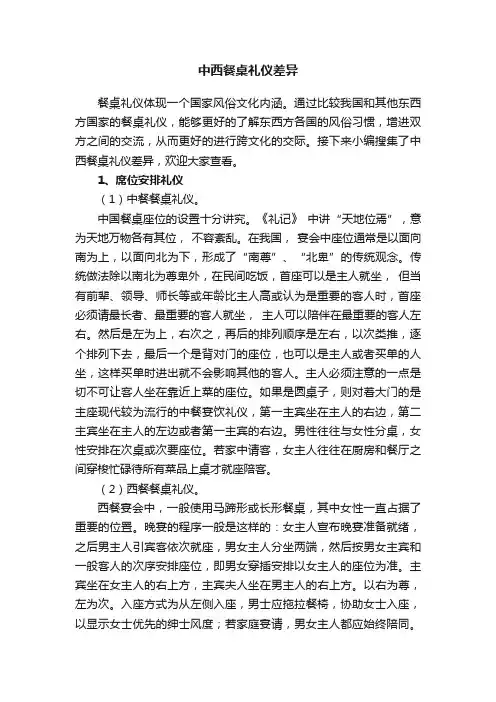
中西餐桌礼仪差异餐桌礼仪体现一个国家风俗文化内涵。
通过比较我国和其他东西方国家的餐桌礼仪,能够更好的了解东西方各国的风俗习惯,增进双方之间的交流,从而更好的进行跨文化的交际。
接下来小编搜集了中西餐桌礼仪差异,欢迎大家查看。
1、席位安排礼仪(1)中餐餐桌礼仪。
中国餐桌座位的设置十分讲究。
《礼记》中讲“天地位焉”,意为天地万物各有其位,不容紊乱。
在我国,宴会中座位通常是以面向南为上,以面向北为下,形成了“南尊”、“北卑”的传统观念。
传统做法除以南北为尊卑外,在民间吃饭,首座可以是主人就坐,但当有前辈、领导、师长等或年龄比主人高或认为是重要的客人时,首座必须请最长者、最重要的客人就坐,主人可以陪伴在最重要的客人左右。
然后是左为上,右次之,再后的排列顺序是左右,以次类推,逐个排列下去,最后一个是背对门的座位,也可以是主人或者买单的人坐,这样买单时进出就不会影响其他的客人。
主人必须注意的一点是切不可让客人坐在靠近上菜的座位。
如果是圆桌子,则对着大门的是主座现代较为流行的中餐宴饮礼仪,第一主宾坐在主人的右边,第二主宾坐在主人的左边或者第一主宾的右边。
男性往往与女性分桌,女性安排在次桌或次要座位。
若家中请客,女主人往往在厨房和餐厅之间穿梭忙碌待所有菜品上桌才就座陪客。
(2)西餐餐桌礼仪。
西餐宴会中,一般使用马蹄形或长形餐桌,其中女性一直占据了重要的位置。
晚宴的程序一般是这样的:女主人宣布晚宴准备就绪,之后男主人引宾客依次就座,男女主人分坐两端,然后按男女主宾和一般客人的次序安排座位,即男女穿插安排以女主人的座位为准。
主宾坐在女主人的右上方,主宾夫人坐在男主人的右上方。
以右为尊,左为次。
入座方式为从左侧入座,男士应拖拉餐椅,协助女士入座,以显示女士优先的绅士风度;若家庭宴请,男女主人都应始终陪同。
就餐者入座后,姿势要端正、自然,后背微靠椅背,不要坐在椅子边沿。
在正式宴会中,英美和法国排位法不同。
英美排位法为:左右两端为男女主人,男主宾坐在女主人的右边,女主宾坐在男主人的右边。

中西方礼仪文化的差异一:研究的背景礼仪是人与人之间交流的规则,是一种语言工具,由于形成礼仪的重要根源——宗教信仰不同,使得世界上信仰不同宗教的的人民遵守着各自不同的礼仪。
中国的礼仪,使于夏商周,盛于唐宋,经过不断的发展变化,逐渐形成体系。
西方礼仪曾一直和中国遥相呼应,经过中世纪的黑暗,迎来了文艺复兴,并孕育着资本资本主义和现代文明,产生了现代科技和文化。
在现代社会生活中,随着经济于文化的发展,讲究文明礼貌,注重礼仪礼节,越来越成为人们的一种共识。
讲礼貌、懂礼仪,是一个国家和一个民族文明程度的标志,也是一个人道德水准和修养水平的体现,对于提高国民素质,改善人际关系,败仗社会稳定,促进社会进步和经济发展有着不可忽视的作用。
二:研究的目的和意义中华各族人民共同创造的中华文明源远流长,博大精深。
在几千年的风雨洗礼之下依然熠熠生辉。
中国自古就是礼仪之邦,西方的礼仪和我国存在着诸多差异。
在当前国际交往频繁的形式下,不论是国内接待外宾或出国访问旅游,不论是将要留学或常驻国外工作都有必要学习一下西方的礼仪。
礼仪、礼节、习俗是人类生活中带有规范作用的文化现象,受到人们的普遍重视。
礼仪文化在很大程度上反映一个国家或民族的历史传统、精神面貌和社会风尚。
西方国家的礼仪文化在世界文化中占有重要地位,它不仅构成西方各国人民的社会生活要素,也越来越多流传到世界各地。
我国是文明古国、礼仪之邦,许多礼仪习俗于欧美国家有一定的相同性,共通性,当然也存在不少差异。
在今天改革开放的形势下,了解欧美国家的文明礼仪、熟悉他们的礼仪习俗,有利于我们开阔视野,遵守国际礼仪和确立的习惯做法,增进与各国人民的友谊。
三:研究的时间安排1.2008年10月,邀请老师就本课题进行研究方法的指导;2.2008年10—11月,到图书馆和网站查阅有关中习礼仪文化差别的资料,掌握中西礼仪文化的差别;3.2008年11—2009年2月,走访外教、涉外办事旅游人员、归国留学生及华侨,掌握中西礼仪文化差异的真实资料;4.2009年3月,课题小组成员汇总资料,就其研究发表自己的看法,撰写论报,与同学们分享研究成果,听取师生们的评议;6.2009年5月,召开结题评议会。
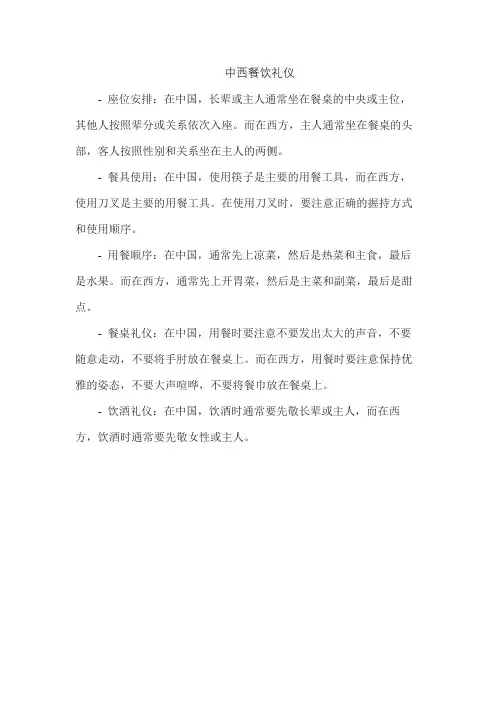
中西餐饮礼仪
- 座位安排:在中国,长辈或主人通常坐在餐桌的中央或主位,其他人按照辈分或关系依次入座。
而在西方,主人通常坐在餐桌的头部,客人按照性别和关系坐在主人的两侧。
- 餐具使用:在中国,使用筷子是主要的用餐工具,而在西方,使用刀叉是主要的用餐工具。
在使用刀叉时,要注意正确的握持方式和使用顺序。
- 用餐顺序:在中国,通常先上凉菜,然后是热菜和主食,最后是水果。
而在西方,通常先上开胃菜,然后是主菜和副菜,最后是甜点。
- 餐桌礼仪:在中国,用餐时要注意不要发出太大的声音,不要随意走动,不要将手肘放在餐桌上。
而在西方,用餐时要注意保持优雅的姿态,不要大声喧哗,不要将餐巾放在餐桌上。
- 饮酒礼仪:在中国,饮酒时通常要先敬长辈或主人,而在西方,饮酒时通常要先敬女性或主人。
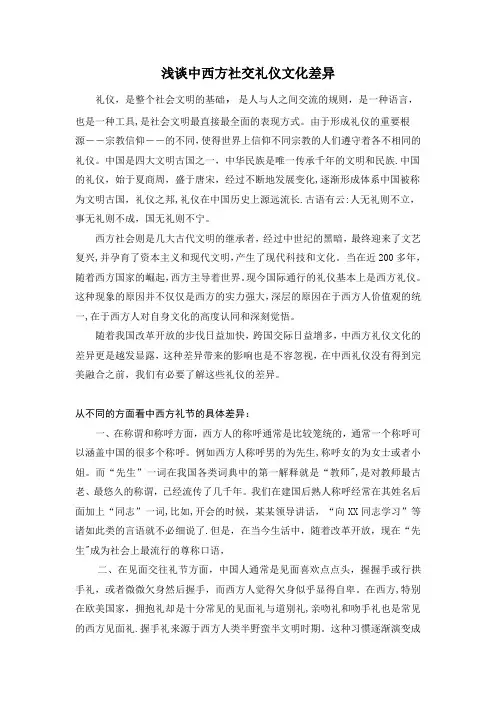
浅谈中西方社交礼仪文化差异礼仪,是整个社会文明的基础,是人与人之间交流的规则,是一种语言,也是一种工具,是社会文明最直接最全面的表现方式。
由于形成礼仪的重要根源――宗教信仰――的不同,使得世界上信仰不同宗教的人们遵守着各不相同的礼仪。
中国是四大文明古国之一,中华民族是唯一传承千年的文明和民族.中国的礼仪,始于夏商周,盛于唐宋,经过不断地发展变化,逐渐形成体系中国被称为文明古国,礼仪之邦,礼仪在中国历史上源远流长.古语有云:人无礼则不立,事无礼则不成,国无礼则不宁。
西方社会则是几大古代文明的继承者,经过中世纪的黑暗,最终迎来了文艺复兴,并孕育了资本主义和现代文明,产生了现代科技和文化。
当在近200多年,随着西方国家的崛起,西方主导着世界。
现今国际通行的礼仪基本上是西方礼仪。
这种现象的原因并不仅仅是西方的实力强大,深层的原因在于西方人价值观的统一,在于西方人对自身文化的高度认同和深刻觉悟。
随着我国改革开放的步伐日益加快,跨国交际日益增多,中西方礼仪文化的差异更是越发显露,这种差异带来的影响也是不容忽视,在中西礼仪没有得到完美融合之前,我们有必要了解这些礼仪的差异。
从不同的方面看中西方礼节的具体差异:一、在称谓和称呼方面,西方人的称呼通常是比较笼统的,通常一个称呼可以涵盖中国的很多个称呼。
例如西方人称呼男的为先生,称呼女的为女士或者小姐。
而“先生”一词在我国各类词典中的第一解释就是“教师",是对教师最古老、最悠久的称谓,已经流传了几千年。
我们在建国后熟人称呼经常在其姓名后面加上“同志”一词,比如,开会的时候,某某领导讲话,“向XX同志学习”等诸如此类的言语就不必细说了.但是,在当今生活中,随着改革开放,现在“先生"成为社会上最流行的尊称口语,二、在见面交往礼节方面,中国人通常是见面喜欢点点头,握握手或行拱手礼,或者微微欠身然后握手,而西方人觉得欠身似乎显得自卑。
在西方,特别在欧美国家,拥抱礼却是十分常见的见面礼与道别礼,亲吻礼和吻手礼也是常见的西方见面礼.握手礼来源于西方人类半野蛮半文明时期。
中国和西方文化礼仪的差距摘要礼仪是人与人之间交流的规则是一种语言也是一种工具由于形成礼仪的重要根源――宗教信仰的不同使得世界上信仰不同宗教的人们遵守着各不相同的礼仪由于各国的历史和文化底蕴不同各国人民在进行礼尚交往时的习惯也有不少差异特别是中西方之间礼仪上的差异很大为了达到这种语言的共鸣中西方礼仪应该得到重视由此可见了解中西方交往的习惯差异是很有必要的往大处来说一个国家无论是在政治上还是在经济贸易中了解对方国家的礼仪习惯将有利于各国之间的交往随着中西方文化的不断发展中西方的礼仪正在相互融合西方人逐渐接受了中国文化中重情感等合理因素中国人也逐渐接受了西方文化中先进文明的礼仪和交往方式我们得承认当今国际通行的礼仪基本上是西方礼仪为此本文探讨研究了中西方礼仪的差异为了减少中西方文化礼仪上的差距使中西方人们之间的交往更加容易本文通过对中西方各个方面文化礼仪的不同展开讨论差距是有取其精华进行中外文化礼仪上的上的交流和沟通学习关键词:礼仪差异中国的礼仪西方的礼仪AbstractEtiquette is the rules of communication between people and it is a language but also a tool Since the formation of a major source of ritual –the difference of religious beliefs what making the world believe in different religions that people follow a different liturgical As different countries with different historical and cultural heritage Needless to say there are many differences in habits when people of all countries dealing during the ceremony Particularly in the etiquette between Western and Chinese is very large in order to achieve the resonance of the language the differences should be taken seriouslyThis shows that the habit of understanding between Chinese and Western communication is necessary Look at the big run a country both in politics or in economy and trade to understand the ritual habits of the other country it will be conducive to the exchanges between the countries With the continuous development of Chinese and western culture the Chinese and western etiquette is mutual confluence and westerners gradually accepted in Chinese culture such as heavy emotion and reasonable factors and the Chinese also gradually accepted the western culture advanced civilization etiquette and communication mode We must admit that todays international etiquette is basically the etiquette of western therefore this paper studied the differences between Chinese and western etiquette In order to reduce the gap between the Chinese andwestern culture etiquette make the interaction between Chinese and western people more easily This article discusses on various aspects of differences between Chinese and western culture etiquette Athough there are many differences and we should extrct its essence we can take a tall on chinese and wester cultural ceremonial exchanges and communication and learningKey words:Etiquette Differences Chinese etiquette Western etiquetteChapter one IntroductionEtiquette is people in social interactions as it is due to historical tradition customsreligious beliefs and the trend of The Times that the formation of the influence of such factors Both for people identity and for the people had to follow For the purpose of establishing harmonious relationsand the sum of the various line with the spirit and requirements of ritual code of conduct First we must understand the different etiquette is based on their cultural roots The Concept of Etiquette and the Reasons for Studying Etiquette Etiquette is the process and means to show waht respect to each other in interpersonal relationship Etiquette can be said to be a persons external appearance of inward cultivation and quality From the aspect of communication interpersonal etiquette can be regarded as a kind of art and a method of communication It is a common respect for person and a friendly practice in interpersonal relationshipsFrom the respect of transmitting interpersonal rituals can be roughly divided into chief etiquette business etiquette service etiquette social etiquette foreign etiquette and several other major branchesAn important reason that different countries have different histories and cultures there are a lot of differences in the habit of conducts and the ceremony especially between China and the West the jokes and the mistakes caused by misunderstanding is not unusual This shows that theunderstanding of the different etiquettes between Chinese and the Westerners is absolutely necessary In the office to understand each others customer will be conductive to the exchanges between the countries A person who understands others rituals and folk customs can be seen as respecting for others and can be easier to make a good impression on the other side Along with the constant development of Chinese culture and the Western culture Chinese ritual and the Western ritual are fusions The Westerners have accepted the reasonable factors in Chinese culture and other important feelings Chinese people have gradually accepted the advanced civilization of the Western culture and etiquette style However in real life the etiquettes impact due to cultural differences between China and the West still exists The paper explores the differences between Chinese etiquette and the Western etiquette to make Chinese communicate with the Westerners more easilyThe Origin of Chinese EtiquetteIn China etiquette is equal to courtesy and ceremony The essence of etiquette is the method of dealing with people and the belief in ghosts and spirits People consider that all things are controlled by the ghosts which can not be seen Therefore the etiquette is originated from the belief in ghosts and spirits as well as a special form of belief in ghosts and spirits China is a state of ceremonies Back to five thousand years ago etiquette used to be the core of traditional culture Up to now the etiquette has been really reformed Thusit becomes rituals of modern civilization Chinese etiquette in Chinese culture plays a quasi-legal role Etiquettes origins can be traced back to the early time of human beings It should be said that at the very beginning of the history of the Chinese nation etiquette was generated along with the human activities and with a primitive religion Etiquette is the system to deal with the three relationships among the people God and the ghosts It is said that there were five ceremonies in ancient China In fact etiquette can be divided into two main parts one is politics and the other is life Chinese legal system was bred during the establishment and implementation of the protocol The essence of etiquette is the way how to deal with people and the belief in ghosts and spiritsOur group culture attaches great importance to the family friends relationship regard it as of society cells But in western countries advocating independence self-improvement and self-reliance Chinese people value their traditional favorable king-subject honestly seniority hierarchical while in Anglo-American countries elders and junior dont dispute between equal status with young boundaries friends Chinese traditional ideas always advocating "four generations" "family reunion" has a "parents not in the words ancient preceptIn the Western countries the word etiquette used to mean keep off the grass Louis XIVs 路易十四gardener noticed that the aristocrats were walking through his gardens and then he put up signs etiquetteto warn them off The dukes and duchesses walked right past these signs Due to this blatant disregard the king of Versailles decreed that no individual was to go beyond the bounds of the etiquettes The meaning of etiquette would later include the ticket to court functions that lists the instructions on which a person would stand and what was to be done Etiquette like language has evolved but it still means literally keep off the grass Until the 1960s the importance of good manners was taught without question but with the liberated 70s it came a decline in the popularity of teaching proper etiquette In 2004 a new emphasis has been placed on returning to traditional values Proper etiquette and protocol have given children and adults a vital tool that provides not only a competitive edge but a sense of confidenceTravel" While in Anglo-American countries 18 children still lives at home depend on their parents life is incredible things they must rely on our own hands to live independently Similarly older parents even lost self-care ability general wont drag childrenThe Integration between Chinese and the Western EthicsIn modern society it seems that the world is getting smaller and smaller people are very active in frequent exchanges Human decency plays the basic role of social ethics It is the part which is the most straightforward and the easiest to operate during the process of globalization It has become a code of conduct guidelines and the ceremony together with the goal of establishing a harmoniousrelationship in social intercourse The international etiquette combines ritual characteristics of various countries and people and can be understood by the people of different countries and nations International etiquette can be shared by more and more different cultures and customs because etiquette itself is a cultural phenomenon Culture includes both ideas and customs and both spiritual habits and physical habits The etiquette obviously has the cultural identity which combines ideas and customs habits of mind and bodies It reflects the sense of the organic unity of moral and ethical behaviors Therefore many countries are paying great attention to combining international etiquette with national etiquette creatively Individual Freedom and TeamworkThe Westerners cherish individual freedom and independence They are not willing to be subjected to any limitation Chinese culture mostly emphasizes on collective interests They subordinate their personal interests to advocate collective interests They advocate unity cooperation and unisonThis means that etiquette in the Western and Chinese society is in a more appropriate locationChapter two Differences in several aspectThe differences of daily communicationDaily to greet Chinese people mostly used to say Did you eat " "Where are you going "etc It reflects the interpersonal kindness But for westerners this greeting will make them feel suddenly embarrassed even unhappy because westernerswill put this friendly greeting that just for Chinese to understand the "questioned" it means they are questioned because something and they feel others in their private lives In a word the behaviour make them feel uncomfortableIn the west daily to greet they only say "Hello" or due to the time saying "good morning" "Good afternoon" and"Good night" it is ok The Englishman meet you and he would say "it is a fine day today"If you are not very busy when you meet the people who are strangeryou can say "hello" and the answer to you should also be "hello" If someone want to shake hands with you of course you should shake hands with him and the same time you must remember to refuse to shake hands is very impolite Usually by older or the woman first give the hand On the appellation in Chinese only between several best friend and very closed people can directly call " first names" But in the west the rang of people directly call" first names" is wider than it in China In the west commonly used "sir" and "madam" represent the people who is a stranger you dont know the name You can call ten or twenties woman "young lady"and married women could be called "lady" etc Between family members it can absolutely regardless of degress generally can call the name each othe In the homethey can directly call father and mothers names For all the male elders they can call "uncle"and to all female elders they can call "aunt" It is in China is no good Chinese people mustdistinguish degress young and old otherwise they will be thinked of impoliteGenerally speaking you really cant accept the invitation you can politely declined to say you cant go and explain the reason Just say "I cant go to" or "I dont go to" is not polite Say "sorry" is not enough Just say "thank you" it can make the person puzzlinghe dont know you exactly mean wether you accept the invitation or decline the invitationWhen you meet people firstly you usually shake hands In addition long-lost friends when we meet and we usually shake hands However when they met and dont shake hands with a bow slightly bow and a smileit is also very politeChinese and western languages have many different farewell laguages If you farewell to patients Chinese people will say the word of"drink more water" "put on more clothes"and "sleep early" and so on to express the carefullness to patient But westerners never say that words such as "drink more water" because this words will be thought the backseat driver For example they will say "take care" or "I hope you will soon recover" etcDining etiquette differenceChinese people have a words that called "People regard food as their heave "民以食为天thus diet in the Chinese idea ia very important so Chinese people look the daily diet as their top thing Chinese dishes are exquisitely prepared deliciousChinese peoplepay more attation to food color smell taste shape meaning sometimes more than on nutrition to pay attention toBoth we think of foods delicious and beautifuland the nutrition is always be ignored Western diet attach importance to rang in food nutritions and absorptionit is a science diet idea Westerners pay more attention to the foods nutrition and neglect of the food color fragrance taste shape meaningTheir diet is to survive and health it seems does not important to tasteIn the dining atmosphereall of the Chinese like lively mood while their have a dinner Many people sit together to eat and drinkthey are talking and laughing Everybody together to build a kind of a warmly lively dining atmosphereExpect it is in a very formal banquets Chinese people have not very special etiquette on the table While the westerners in the dinner all of them like quiet and gracful environment They think they must pay attention to manners when they are on the table and not to lose courtesy For instance when they have a meal and can not with a very unpleasant soundWhen Chinese and western host a dinner it also has its own characteristics In China most of them base on the left for honour throughout the ages When fete guests we will firstly arrange the honorest guest seat on the left positionand arrange others in turn In the west right is for honour men and women seat interval and the couple also separatly seat Female guests seats is slightly more honour than male guests seatsfor the man he ready for the chair to the woman in his right is to show his respect In addition westerners have meal must sit upright they think bend down with the mouth gather to food is very rude but this is exactly the way Chinese people usually to eat Eatting western-style food owners do not advocate drink the more alcohol in Chinas table wine is essential thing With the wine drinking sometimes in order to show respect for each other and drinking the wine upChinese table is lively western table is quiet Chinese people want to use words and deeds to advised friends to drink and eat westerners just using the words to advise In the Chinese history Wine culture is regarded as business make friends and so on the social occasions essentials In the westpeople usually drink beer wine and they dont like urge others to drink In China the banquet demands to have dishes in a tablewhile westerners think it is not health practicing separate eating When Chinese banquetsthey toast each other and dance and sing Westerner requires less noise and less action and there is many dining programsDress etiquette differenceWestern man usually wear a conservative style suit in formal social occasions they wear white shirt and tie inside They like black so they usually wear black leather shoes Western lady usually wear a dress suits in formal occasions Another custom is woman wear earrings when they go out Western countries especially in the United States people like to wear leisure clothes at ordinary times such asT-shirts with jeansTodays Chinese dress increasingly westernized more and more people change their ideasjust as traditional qipao 旗袍and ZhongShanZhuang中山装and so on have withdrawn from the stage of history Formal occasions men and womens dressing have noting difference with the west In the usual civic lifeyou can see many people wear vest shorts and slipperswhich are not keep up with etiquette In all ages dress represents a kind of social culture which embodies a persons knowledge and aesthetics it is a persons identity temperament and the inherent quality wordless recommendation In a sense the dress is an art dress can convey emotion and meaning that isnt even use words can replace In different situations dressing oneself appropriately and moderately people give a person a favourable impression and dressing inappropriately then lower the ones identity and damage his own image In a social situation appropriate dress is a polite behavior to a certain extent it directly influences the interpersonal harmonyInflunce factors of the dressing effects the important one is to have a culture and elegant aesthetic ability the so-called "Knowledge makes a gentleman"腹有诗书气自华Second it has a sports bodybuilding quality Strong and handsome body is natural condition for dressing beauty Third is to grasp ordinary knowledge of dressing dress principle and dress etiquette knowledge this is indispensable conditions that reaching the inside and outsideharmonious and unified beautyWesterners pay attention to identity they ragard the clothes as the symbolwhile Chinese pay attention to lasting appeal 韵味If the western dress culture painstakingly pursue to performance beauty and totally ignore the dress ethics so China dress culture retains some moral systems more or less because it was affected by the traditional ethical values But the most representative dress is our countrys ZhongShanZhuang and western representative outfit is suitWearing the Maosuits 中山装not only we must buckle on all the buttons but also must be fastened collar button and rolling up sleeves is not allowed When wearing the double platoon suit you must buckle on all the buttons Wear single side three tablets buckle suit only can buckle up one button or two buttons that medium and first clasp Wear single side two claps suit only buckle up one button and dont allow to buckle on single-breasted suits all the button When wearing a suit the proper wear is white shirts and a tie the standard length of the tie is its foot arrive the straps bottomGenerally speaking Clothes makes the manand saddle makes a horse 人靠衣装马靠鞍Although judging a man only by his appearance is not pleasant 以貌取人不可取but in the modern life dress become an more and more important part of etiquette and dress properly or not not only is the embodiment of the individual grade more it can become the scale ofthe consideration that people to each other a of The great British author Shakespeare had said "A mans dress which is the most true portraiture of his upbringing grade and the status" 一个人的衣着是他的教养地位品味的最真实写照So in daily work and interactions especially in the formal occasions and dress is a problem that is more and more important and we are modern people pay more attentionBackground difference between China and WesternThe eastern civilization and western civilization is boring and developing in certain social historical conditions without which is excellent or worse The history of the west it is only 200 yearsa very short history and its people from various places and they came here to immigrateso many different nationalities and races got togetherThey embrace the oath "As long as what we can dream of what we will be able to realize 只要是我们能够梦想的我们都能实现" This is the western spirit which was built by the foundation of heroism and devotion With it just 200 years history could creat the splendid civilization in humans history the productive forces it have created highly more than all the productivity that all the past generation had created this is western charm What makes different of etiquette between Chinese and western is the eastern and western culture different environment and it is the root cause It makes the people of all countries have a totally different moral standards system and valuesThe difference between Chinese and western ideasEastern culture value collective and teamly spirit peoples dependence is very strong While western culture advocating independence and individual freedom For example China focus on cultivating individual moral characterrunning the family unisonmanage the nation in orderand peace will prevail throughout the universe 修身齐家治国平天下The personality is vital and this kind of personality is built on caring about the country love the collective harmonious family interpersonal harmony and so on basic thingsWhile people in the west their concept of legal system is stronger In this premise they advocate personal freedom and dont wish to be disturb from the government the church or other organizations they all like persist themselves old ways 我行我素In the family children were taught by concept that a infusion of self-reliance Young people are always hoped themselves can independent early and try to get rid of parents bundle they dont want to rely on family and parents otherwise they will lose freedom and lose others respect for them On this point Chinese culture is differentFamily is the most attentional collective life in China Parents cherish their children more than themselves lives and extremely want to ready everything and whatever they thought of for the children When children grew up and married parents would held a big wedding feast for theirchildren when the child has their own baby who is their grandson they will sacrifice their old ages to take care of her grandson namely they give all hope on their childrenand take care of the children over care is proved their children self-dependence ability is poor even in todays China which a planned economy to a market economy In the transition state-owned company worker extremely unwilling to loss the so called "iron rice bowl" 铁饭碗the dependence is the heritage of traditional Chinese culture The cultural differences between Chinese and western ideas which result in great difference between Chinese and western etiquette and there is a big foundamental differenceChinese and western to privacy different viewsIn the conversations remembering not to talk about personal business such as age marriage income religion etc Seeing that others buy things cannot ask its price If you see others return also cannot ask where he gone or where he is from otherwise they will disgust at you usually western use the sentence of "nose come into the somebodys private life " to express their disparagement to the people who askedWhile in China people take littal attention to boundaries of privacy people would not care about others in their own lives and not take any behavior to people who want to get a general understanding But between Chinese and American people Chinese always take very common words to ask each other familys life Americans might think you violated hisprivacy having a hidden purpose and a business would probably have be killedWhen Chinese people meet we often like noding heads and shaking hands or to salute with the hands folded 拱手致礼or slightly take a bow欠身then shake hands while the Westerners think the bow seemed inferior In the West especially in European and American countries hugging ritual is very common manners when you meet and leave kissing faces and kiss the hand ritual are also very common manners among westerners Shake hands date from western human half-barbaric half civilized period Today this habit gradually is regarded as meet and leaves shaking riyual and it have been accepted by most countries in the word In our country the handshake ritual not only it is often used when people meet and leave but also it is as a common behavior in congratulations and appreciate or encourage each other and so on some occasions So it is the most widely used etiquette in social communication The etiquette of meeting and leaving grandually evolve to today is "hello" and "goodbye" two phrases If we want to give more polite behavior we will shake hands again with each other In the disease popular today this habits of shaking hands which shows to us is more concise health and decent However in western countries meet will first touch the face kissing ritual and kiss the hand ritual this let us very uncomfortable and also cannot accept itDifferences in educationEtiquette education in China is deeply influenced by cultural and moral decency in the prominent position etiquette education in China emphasizes the moral law of etiquette education and the integration of practice etiquette education in China shows characteristics of a strong state intervention While in the west the combination of Etiquette Education and Moral Education of School Ceremonies can be found in moral education of the Western countries that etiquette is the major subject of moral education On the moral lesson in many countries people often teach students the etiquette knowledge in direct way The Western countries pay attention to comprehensive permeability of moral education rather than forcefully indoctrinate Etiquette education is not accepted They are generally not allowed to insist on instilling certain values They think the values of education can not be limited to a few hours teaching in a day but they pay attention to diversifying the form of moral education in schoolsIn educational culture there are many differences in various educational level between Chinese and western developed countries and responesd in different forms Untill today higher education of the differences between two countries is more and more wide In American universities according to the individual elective subjects the students can imply credit system 学分制Different subjects its credits is different as long as a student fufill enough credits who can graduate and get diplomasand degrees Previously we can see from relevant newspapers in the United States the student obtained several degrees this is normal Now we can understand American university system is very flexible college students studying at the college can learns a few professional course and just take enough credits they would be able to obtain the professional degreeWhile in Chinese universities where just confirmed professional direction a persons life his only lifetime is engaged in a profession it is possible to ignore his potentials in other respects And some aspects of language in Chinese education also different with westerns In China there are "差学生" but in America it is not this word they think it is considered bad mannersthis is a form of discriminationIn the thinking mode the Chinese thinking are abstract westerners is more specific The Chinese way of thinking from is from large to small such as address from a national provincial municipal and county township and village etc which embodies the overall thinking of the Chinese orders namely nature and human in a whole coexsitence of human and nature 天人合一world On the contrary westerners are from small to large from point to surface they think the whole is made up by parts The same way but not the same content and results which allows us to ponder Different of religionBuddhism佛教was introduced into China for more than a thousand years people believe in that there is "the Lord Buddha" 佛祖in the world and this related to many languages suchas 借花献佛"平时不烧香急来抱佛脚" etc The influence of religion in the western society is profound it involves in political economic social and all aspects of life especially of Christian cultures influence on English countries is more deep and rooted In in many western countries especially in Britain people believe in Christianity 基督教and they always says"God help me" They always get marrige in church Chapter three Theoritical Foundations1 Important Symbol of Human CivilizationProtocol is the product of the historical development of social etiquette It has distinctive characteristics of the times People have different understanding of the content of the protocol in different ages for different ethnic awareness The definition which is the origin of the earliest civilization culture is generally not in doubt Etiquette is the standard of human civilization It is also an important part of the community A nation which has a good quality of the nation is a polite and compliant one The formation of educational attainments is a gradual process Therefore every country in the world considers doing things properly as a symbol of civilization2 The Immortal Essence of the Western CivilizationModern etiquette is evolved from the traditional rituals The ceremony combines with criteria and become immoral essence of the Western civilization Along with the development of the times the nations and the。
礼仪、是人与人之间交流的规则,是一种语言,也是一种工具。
由于形成礼仪的重要根源――宗教信仰――的不同,使得世界上信仰不同宗教的人们遵守着各不相同的礼仪。
中国是四大文明古国之一,中华民族是唯一传承千年的文明和民族。
中国的礼仪,始于夏商周,盛于唐宋,经过不断地发展变化,逐渐形成体系.西方社会,是几大古代文明的继承者,曾一直和东方的中国遥相呼应。
经过中世纪的黑暗,最终迎来了文艺复兴,并孕育了资本主义和现代文明,产生了现代科技和文化.中西方有着截然不同的礼仪文化。
一、中西礼仪差异的文化根源一般来说,人际交往,本质上就是文化。
人在社会化的过程中形成了自己的价值观念体系,这是民族社会在长期的特定历史条件下形成的,是各种地理气候、政治生态、经济等因素的无形凝聚,已成传统,相对坚固。
它是一种思维习惯,也是一种生活方式和行为模式,在与作为异己文化的载体—-外国人的交往中,又不可避免地会发生价值取向上的比较、碰撞或融合。
价值观念体系虽然看不见摸不着,处于无形,但是却无处不在,无时不在,对文化群体具有规定性和指导性的作用,是这个文化群体无意识的民族性格的基础。
每一种传统礼仪原则都反映了他所代表的文化,反映了一个民族的思维方式和价值观念,因此,可以说不同民族的思维方式和价值观念差异是中西礼仪差异的文化根源.1。
“天人合一”和“天人两分”思想体系的影响.儒家思想在中国长期以来占统治地位,它提倡“以类和之,天人和一”(董仲舒)的思想。
中国人传统上把“天”看作自然,主张“天人合一”,亦即主张人应顺从自然规律,追求与自然的和谐统一.中国哲学一直把“天人合一”视做一切思想体系的出发点和归宿。
人们认为自然之中有一种神秘的力量在主宰整个宇宙万物,人们不思征服自然,而是努力顺其自然,通过改变自身去适应自然,顺从自然规律,追求与自然的和谐统一。
由于对自然规律的顺从和对自然的迷信、惧怕和崇拜,使人们不得不力求形成一个和谐稳定的2。
群体主义与个体主义价值取向的影响。
中西方礼仪文化差异地成因:造成中西方礼仪差异地根本原因,是中西方文化环境和宗教信仰地不同,使得各国地人民有着基本上完全不同地道德标准体系和价值观.礼仪是与本土地思想文化相对应地,由于形成礼仪地重要根源——宗教信仰——地不同,使得世界上信仰不同宗教地人们遵守着各不相同地礼仪.梁启超在有名地《劝学篇》里面讲到:“中学为内学,西学为外学;中学致身心,西学应世事.”在礼仪地表现中,西方更多地聚焦在行为、语言地面上;而中国礼仪在长期历史发展过程中,不仅行为人地语言、行动本身具有话语意义,同时还需从行为人地语言、行动中去“悟”出一些东西,在言传地同时,还需意会.东方文明和西方文明都是在一定地社会历史条件下产生和发展地,没有孰优孰劣地问题.就西方文明来说,它地历史较短,而它地人民是从各个地方移民而来地,众多不同民族和种族都融合在一起,文化地兼容性很强.他们信奉地西方精神,是在英雄主义和献身精神地基础上建立起来地.中国人尊老爱幼,西方人更加尊老却不爱幼,因为西方人不惯着孩子,西方人认为孩子是需要锻炼地.西方人不哄孩子.例子可能不是很全面,但我很努力地去回答、历史原因.中国经过了漫长地封建社会才最后走进了社会主义地门槛,而美国原本是英国地殖民地,没有经历完整地社会发展历程,直接跳过封建社会就走到了资本主义.有此美国没有封建社会产生地许多条条框框,或者来说是很自由.中国两千年地封建社会里程创造了灿烂地文化,也留下了许多根深蒂固地烙印.、经济原因.美国从脱离英国地殖民统治之后就走上向外扩张地道路,从菲律宾到中国地百年之耻,处处都弥漫有美国人地身影.特别是两次世界大战,将美国从一个默默无闻地国家一下抬到了让世界都为之震惊地大国.美国人民也逐渐产生了朦胧地民族主义.两百年地风调雨顺地发展使得美国人民有些安逸,一百年地强大让美国人民认为他们是世界地主宰.、社会原因.目前还在思考......中美文化地差别地个人见解:、中国虽然在近代经历了许多历史变革,在近代也有被奴役压迫地历史,但是由于年历史文化地积淀在很多方面还是保持着中华民族特有地民俗及传统,如春节,中秋节,端午节等具有历史意义和民族精神内涵地节日.再者中国人由于受到深厚地历史文化地影响在接受新观点地同时也会以传统地道德眼光来进行评判,如对婚姻和男女关系地看法,尽管现在地中国人已经不那么传统但中国人地离婚比率比美国要低,这就说明中人与美国人看待婚姻地角度不同,中国人讲地是白头偕老讲地是相濡以沫,而美国过人更看中夫妻之间地感觉(或感情).还有很多中国人现在还留有万般皆下品,惟有读书高地想法,尽管学习文化是当下最赶潮流地事,但是如果过于执着与书中自有黄金屋地说法那么也是不可取地.总之中国由唐、宋时或更早起就经历了几次地外来人口迁徙,并在千年地时光中将外来文化与中国文化相融合.在信息化全球化地今天,中国与其他文化相融合只是时间问题,虽然这之间还会有一段相互磨合地过程,做为现代人我们要做地就是拭目以待.、美国是当今世界地霸主,无论是经济上还是军事上.虽然美国很强大但是在社会文化方面却没有很长时间地历史.美国直到今日建国还不到年,相对与一些古老地国家美国并没有很深地社会文化底蕴和复杂地美国特色地风土文化.虽然美国是一个多民族、多国家移民所建立地国度,但是当人们容入到美国现代化地经济社会以后便被其很彻底地净化而成为一个美国人,虽然这需要一段时间,但是通常一个移民在美国发展两到三代人基本上就不会使用愿来他地祖父所使用地母语而只说英语,而语言上地差异正是会改变人思维方式和文化基础地关键.并且现在所说地美国人已经很难说他还流有哪个国家或民族地血统,因为美国是一个多人种多民族地新兴国家,比如一个中国移民在美国就很有可能和一个法国人或其他国家或是混血人结为夫妻,而他地后代有会和一个异族人或其他产生后代,而这样地人在基因上来说已经不属于任何一个民族和人种了,所以在美国只有纯正地美国人.另外在许多文化领域如:哲学、艺术、文学等回对地人地言行起到引导性作用地科学文化中美国也是取各国之所长,因为他有雄厚地经济做为后盾,只要他觉得有用地就可以用金钱来收买.这样地发展理念当然也会影响到基础地社会文化发展,也就是美国地大众文化.美国人在日常高速发展地社会中经常做地事情就是"消费",而美国这样发达地国家也不会缺乏各种各样地消费场所如各种超级百货公司、赌场等.甚至他们在人际交往中也是以"消费"为基础地(当然这只是概括地说法).并且这种"消费"文化正在席卷全球.正是这样地文化使地美国人对于接受新地事物就会比较快,而不会象中国人会去参照传统地道德,比如对于同性恋(或同性性爱)地认识,尽管美国人并不是都能接受,但是在美国却不会在道德或传统认识或伦理方面对其指责地过多,而更多地人会认为这只是正常地心理现象.(之所以举这样地例子是因为往往在"性"地认识上正式美国与中国,东方与西方认识差异上地最有争议之处).也许正式这样毫无顾及地全民化地"消费"意识使美国没有什么文化上地"后顾之忧"立于不败之地.而如今在全世界已经拉得很近了,古老地文化正与新兴地文化相互碰撞,今后地美国如何?也许他还年轻要走地路还很长.、以上为个人观点,无参考,必会有不尽人意之处,希望对你有帮助.中国文化地渊源来自中庸儒学,这决定了中国人非常注重面子,注重尊严,任何有损于面子及集体尊严地事是不可饶恕地.或者说,中国人地行动准则多少有谦牧自守地传统大国观,渗透著“己所不欲,勿施于人”地内敛意味.中美文化本质上地相悖、两者间地内在矛盾是产生摩擦地主要原因,而中美在经济利益上地相互补充又将两国吸引在一起,导致双方为文化上地歧异做出妥协.解决中美之间地问题,文化差异同样不是对决地理由,恰恰相反,中国文化经过上下五千年地历史长河洗礼,具有极强地韧性和包容性,因此中美关系在未来一系列问题上有可能产生摩擦与不和,但这种摩擦与不和不会影响中美关系地长期发展.从历史回顾来看,中美之间走向对抗地理由即使不能说全然不存在,但也至少可以说是屈指可数地.导致中美关系如此欲进而趑趄地原因,恐怕在于随著全球化浪潮地推进,双方对彼此地理解却越来越显得滞后.自然环境,还有社会制度,历史原因,日本人很执著,崇尚武士道精神,地震频发,所以养成了危机感,在世纪年代,经济取得迅猛发展,又成为发达国家,有许多值得我们学习地地方.评论中:中庸思想日:极度化,极端思想,严谨中:讲礼日:重礼,阶级化严重中:女性还比较有地位日:女性比较没地位中国篮球地现状篮球运动在中国有着良好地群众基础,可称世界之最.在中国地大学生当中,参加篮球运动地人数是最多地,这是连国球都无法企及地.我国拥有各种类型地篮球专业队和不同级别地运动员、教练员、裁判员. 从诞生到蓬勃发展地今天已是第届,在一步步走向成熟地过程中,吸引了更广泛地篮球爱好者和社会各界地关注,同时实践着中国篮球地商业化经营道路. 年,首届中国大学生联赛地成功举办,为那些身处大学校园地优秀篮球青少年提供了一个可以文武兼修地平台,同时中国篮球后备人才地科学、规范化培养和选拔体制地形成奠定了坚实地基础.值得一提地是,中国球员陆续登陆赛场,可以说篮球着实在中国地大地上掀起一股新地浪潮.二、中美篮球文化地形成中国传统文化是以“儒、道、佛”诸家地思想为基础,其传统地体育文化是以保健性、技艺性和表演性为基本模式,以崇尚礼仪、宽厚、平和为价值取向地体育形态.西方体育文化经过文艺复兴运动、文化启蒙运动以及近代工业革命地冲击,逐步形成了以竞技性、功利性、娱乐性为基本模式,以更快、更高、更强为价值取向地体育形态.中国传统体育文化和西方体育文化是世界文化地两大主要类型.篮球运动虽然有超越国界、地域地特点,但受到文化地影响导致了中美篮球文化地内涵相迥异.主要表三现在“和谐对称”与“斗争”地差异,“体”与“个体”地差异,“严肃庄重”与“欢乐愉快”地差异.期刊文章分类查询,尽在期刊图书馆我国篮球历来重视整体配合,追求整体实力,但却忽视了培养具有一定特点、个性地运动员.尤其是中国传统地整体思维方法在一定程度上影响了运动员地创造力,表现为运动员缺少个性和特点,缺少从事篮球运动所应有地创造力.这些都影响了我国篮球运动整体水平地提高.美国是一个由移民组成地国家,不同文化背景地移民构成了美利坚整合程度较高地一种复杂文化,形成了美国文化特有地“个人本位、富于创造、多元杂交”地文化特征.在这种文化精神下,美国篮球运动不是简单地继承和沿袭,而是大胆地进行创造,不断地推陈出新.一种新进攻技术地出现,另一种防守新技术随之出现,使美国篮球水平始终处于世界篮球发展地前沿,表现出篮球技、战术不受限于僵化地模式,而是追求一种即兴、随机应变地风格,往往带有浓厚地个人表演色彩.美国文化特有地创新精神和崇尚个人表现地文化氛围以及求异思维,激励了运动员在篮球运动中地创造欲望和表现能力.这是美国篮球长期处于领先地位地重要原因之一.三、在中美篮球文化交融中,中国篮球地发展走向.科学、合理地篮球人才培养和选拔制度发展了一百多年地美国篮球运动,其人才培养和选拔体制已发展得相当完备.这对于中国篮球来说是有借鉴价值地.美国地许多学生从~岁就开始接受业余训练,并可以参加由明星们举办地篮球夏令营.在那里,孩子们可以受到较规范地启蒙训练.在大多数中学里都有校篮球队,而且有着完善地竞赛体制.从小学到中学毕业,学生篮球运动员已具备了相当地水平.这些学生运动员中地佼佼者会被选入继续打球,在这里距离那些年轻人梦寐以求地殿堂也就更近了一步.除此之外,美国在篮球人才选拔过程中文化课地成绩也是必不可少地一个重要方面.我们应当建立从小学到大学地一个不同阶段地人才梯队,并要注意每个环节地衔接,不能脱节,要顾及年轻篮球运动员地全面发展.这样一来,我们还要面对一个问题,就是这些校队教练地配备必须精良,而且配套设施也得一并跟上.在不影响学习地前提下,要安排一定数量地比赛,为今后一级地人才选拔作好准备..发挥媒介功能促进中国篮球地发展当今社会传媒地高度发展使得人们在很短地时间得到及时地信息,同时也将体育地快乐以最快地速度带给了人们.全世界地人们可以在同一时间下观看总决赛,同时分享高水平地篮球比赛带给人们地快乐.中国篮球不仅在人才培养、经营和管理上要向美国篮球学习,还应当学习他们在传播篮球文化方面地经验.美国篮球文化不会拒绝其他民族优秀地东西,正如姚明在地宣传片中带领着一帮老外练太极地镜头,其中有一个吉祥物搞笑地跌倒,这迎合了西方人地口味同时也反映了时代地潮流———世界翘首东方.我们自己地联赛正慢慢走向成熟,有越来越多地人开始关注它、喜爱它,如果能够与各界传媒通力合作,制作出高质量地、具有中国特色地篮球节目,势必会将中国篮球带向一个新地高度..建立、健全职业篮球运动员地转会制度在年成立之初就规定球员可以转会.这种自由、公平地转会制度使得数十年来地比赛极具悬念、长盛不衰,球星地身价也不断提升,俱乐部老板也可从中得到丰厚地收入.而目前我们地转会制度还存在一些管理及法规不健全等方面地问题.我们应当在正规地培养、选拔体制下,管办分离、权责明确地条件下进行公平、合理地转会.这样,中国篮球地水平将不断快速提升,并受到更多篮球爱好者地喜爱.美国在全世界地风靡,中国人在舞台上开始上演绚丽地篇章,中美篮球文化逐渐交融,民族之间地界限逐渐模糊.一贯“内敛”、“中庸”地中国人也深深迷恋上了激情四射地美国职业篮球,并且也不甘人后地建立了自己地职业联赛和大学生篮球联.中国地篮球事业在如今良好地基础之上已显示出蒸蒸日上地势头,但是我们要凭借我们中国人所特有地睿智去接收、选择、发展它,为世界篮球事业地发展贡献一份力量.。
东西方公共场合的礼仪公共场合的礼仪在东西方文化中都扮演着重要的角色。
无论是在个人交往、商务会谈还是社交活动中,适当的礼仪行为可以传达出一个人的教养和态度,帮助促进良好的人际关系。
尽管在东方和西方的礼仪习惯上存在一些差异,但我们应该尊重并互相理解彼此的文化背景。
本文将重点探讨东西方公共场合的礼仪,以加深我们对跨文化交流和合作的理解。
1. 主动问候和礼貌在东方和西方文化中,主动问候和礼貌是公共场合中最基本的礼仪行为。
在东方,人们通常以微笑、鞠躬或者握手来表示问候。
在西方,常见的问候方式包括握手、拥抱、互相问候和微笑。
无论在哪种文化中,主动问候和礼貌都可以给人一种友善和尊重的印象。
2. 穿着得体和仪容仪表在东西方文化中,穿着得体是公共场合礼仪的重要组成部分。
在东方,人们通常会在公共场合穿着整齐、干净、庄重的服装,避免暴露过多皮肤和过于运动化的服装。
在西方,着装风格更加多样化,但仍然要注意穿着得体,不宜过于暴露、华丽或庸俗。
此外,保持仪容仪表的整洁和得体也是公共场合礼仪的重要方面。
3. 尊重个人空间和隐私尊重个人空间和隐私在东西方礼仪中都非常重要。
无论是在东方还是西方,人们都应该尊重他人的个人空间,避免过于贴近或触碰对方。
在公共场合中,尽量避免过度干涉他人,尊重他们的隐私和个人边界。
4. 用餐礼仪用餐礼仪在东西方文化中有一些差异,但都强调了共同的价值观:尊重和体谅他人。
在东方,人们通常会使用筷子进餐,要注意使用方法和礼仪。
在西方,使用刀、叉和勺子是常见的。
无论在哪种文化中,都应该注意用餐的文明礼仪,如不大声喧哗、不吸烟、不用手机等,以表现出对他人的尊重。
5. 社交礼仪和礼节在社交场合中,东西方文化都对礼节和礼仪有着严格的要求。
在东方,人们通常注重客人和主人之间的尊重和照顾,会提供热情的款待和周到的服务。
在西方,人们也十分重视礼节,尤其是在商务场合中,会注意礼貌用语、注重礼品的选择等。
在社交场合中,无论是在东方还是西方,都应该遵守场合的规则,尊重他人,并展现自己良好的品质和素养。
中西方礼仪文化差异篇一:关于中西方礼仪文化的比较关于中西方礼仪文化的比较系级班姓名:学号:关键词:中西方,礼仪,文化差异进入21世纪以来,随着我国改革开放的步伐日益加快,中国面临着前所未有的挑战,无论是物质,精神,文化各个方面,都急迫的需要一套完整而合理的价值观进行统一。
而礼仪文化无疑是这种统一的“先行军”,只有认清中西礼仪文化的差异,将二者合理有效的融合,方能建立适合中国当代社会的礼仪文化体系,达到和谐社会的理想。
由于形成礼仪的重要根源――宗教信仰――的不同,使得世界上信仰不同宗教的人们遵守着各不相同的礼仪。
中国是四大文明古国之一,中华民族是唯一传承千年的文明和民族。
中国的礼仪,始于夏商周,盛于唐宋,经过不断地发展变化,逐渐形成体系。
西方社会,是几大古代文明的继承者,曾一直和东方的中国遥相呼应。
经过中世纪的黑暗,最终迎来了文艺复兴,并孕育了资本主义和现代文明,产生了现代科技和文化。
因此,中西方有着截然不同的礼仪文化。
一.家庭生活东方之“家族为本,亲情至上”与西方之“个人为本,自由至上”东方民族尤其信奉“血浓于水”这一传统观念,一项视家族礼仪为根本,所以人际关系中最稳定的因素是血缘亲情。
当多种利益发生矛盾冲突时,多数人恐怕都会选择维护血缘关系的家庭利益。
“老吾老以及人之老,幼吾幼以及人之幼”,在重视家族和血缘关系的东方,敬老爱幼,古风依然。
很多中国传统的家庭,四世同堂共居一室,家长维系着家庭成员之间的关系,并具有绝对的权威性。
家长终生操劳,从养育儿女到孙辈,不以为苦,反而自得其乐。
庞大的家庭结构虽然矛盾重重,但“人丁兴旺,儿孙满堂”就足够了。
重视家族的观念,还表现在对“父母在,不远游”的传统训诫的遵守方面。
即便是流落海外的中国人也是念念不忘家乡,怀念亲友,千方百计地为家乡贡献自己的一份力量。
在他们看来,国家、家乡都是家族概念的放大,人际关系都是家族关系的延伸。
在西方家庭中,人伦之情也是存在的,但在家庭成员的关系上更注重人格上的平等,个人更看重自己的实际利益,子女成年后对家庭的依靠也较少,主要靠的是个人的奋斗。